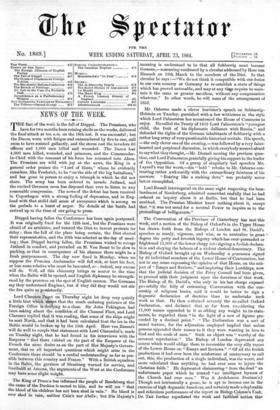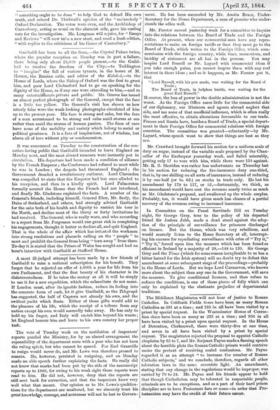The Convocation of the Province of Canterbury has met*this week,
and a motion of the Bishop of Oxford's in the Upper House has drawn forth from the Bishops of London and St. David's speeches so manly, vigorous, and wise, as to neutralize in great degree the petty and feverish bigotry which has over-persuaded or frightened 11,000 of the lower clergy into signing a foolish declara- tion and obeying the behests of a violent clerical democracy. The Bishop of Oxford brought up on Wednesday a gravamen signed by 40 individual members of the Lower House of Convocation, but not in any sense expressing the opinion of that House, on the sub- ject of " Essays and Reviews," and imploring their Lordships, now that the judicial decision of the Privy Council had been given, to proceed with their judgment upon the doctrines of that work. The Bishop of St. David's, who only in his last charge exposed pow erfully the folly of entrusting Convocation with the cen-
sorship of religious books, said it would be better to sign a •
dogmatic declaration of doctrine than to undertake such work as that. He then criticized severely the so-called Oxford Declaration, and declared that, so far from considering the 11,000 names appended to it as adding any weight to its state- ments, he regarded them " in the light of a row of figures pre- ceeded by a decimal point." " The Declaration was a sort of moral torture, for the adjuration employed implied that unless persons appended their names to it they were wanting in love to God and the souls of men." Such an object was " worthy of the severest reprobation." The Bishop of London deprecated any course which would oblige them to reconsider the very silly report of the Lower House on "Essays and Reviews." " Of all the foolish productions it had ever been the misfortune of controversy to call out, this, the production of a single individual, was the worst, and more calculated than anything he had ever seen to injure the Christian faith." He deprecated disinterring " from the dead" an unfortunate paper which he trusted "no intelligent layman of the Church bad ever seen." Was it Archdeacon Denison's P Though not intrinsically a goose, he is apt to become one in the exercise of high dogmatic functions, and certainly made a deplorable and ridiculous performance of the report on Bishqp Cplenso's rook. Dr. Tait further repudiated the weak and faithlesi notion that
" something ought to be done " to help God to defend His own truth, and echoed Dr. Thirlwall's opinion of the " melancholy " Oxford DeclaratiOn. The votes were even; and the Archbishop of Canterbury, acting as usual on the alarmist side, gave his casting vote for the investigation. Mr. Longman will rejoice, for " Essays and Reviews " will now take a new start, and need a fresh edition, " with replies to the criticisms of his Grace of Canterbury."































 Previous page
Previous page